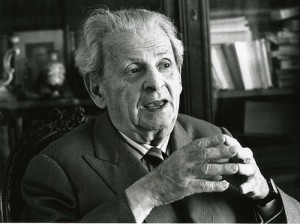Levinas says in an interview:
“I am extremely grateful for what I learned from him [Shoshani]. In a haggadic text of the treatise 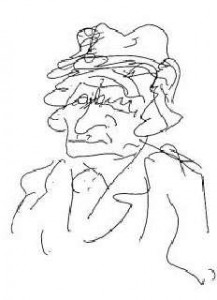 Pirke Avoth, there is this phrase: “The words of the sages are like glowing embers.” One can ask, why embers, why not flame? Because it only becomes a flame when one knows how to blow on it! I have hardly learned to blow. There are always great minds who contest this manner of blowing. They say, “You see, he draws out of the text what is not in the text. He forces a meaning into it.” But if one does it with Goethe, with Valery, with Corneille, the critics accept it. It appears more scandalous to them when one does it with regard to Scripture. And one has to have met Shoshani in order not to be convinced by these critical minds. Shoshani taught me: what is essential is that the meaning found merits, by its wisdom, the research that reveals it. That the text had suggested it to you.”
Pirke Avoth, there is this phrase: “The words of the sages are like glowing embers.” One can ask, why embers, why not flame? Because it only becomes a flame when one knows how to blow on it! I have hardly learned to blow. There are always great minds who contest this manner of blowing. They say, “You see, he draws out of the text what is not in the text. He forces a meaning into it.” But if one does it with Goethe, with Valery, with Corneille, the critics accept it. It appears more scandalous to them when one does it with regard to Scripture. And one has to have met Shoshani in order not to be convinced by these critical minds. Shoshani taught me: what is essential is that the meaning found merits, by its wisdom, the research that reveals it. That the text had suggested it to you.”
Tag Archives: talmud
Elie Wiesel in an interview in 1978 talks about Shushani / Chouchani / Shoshani / שושני
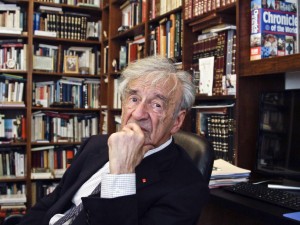 In an interview of Elie Wiesel in 1978:
In an interview of Elie Wiesel in 1978:
INTERVIEWER
What about Rav Mordechai Shushani? Where did you and he meet?
WIESEL
We met in Paris and I stayed with him for several years. He was a strange man. A genius who looked like a bum, or a clown. He pushed me to the abyss. But he believed in that. One day I am going to write a monograph about him. His concept was to shock, to shake you up, to push you further and further. If you don’t succeed, too bad. But you must risk it. If I had stayed with him longer, I don’t know what would have happened.
INTERVIEWER
Did he push anybody over the abyss?
WIESEL
He did. I heard stories later when I began picking up pieces looking for him. He did it with the best of intentions. Few people have had such an influence on my life as he did.
INTERVIEWER
Who were the others?
WIESEL
Here and there a teacher, a friend. But he is probably the strongest. He’s the opposite of Professor Saul Lieberman, who is no longer alive, but whom I considered to be the greatest Jewish scholar of his day. One cannot study the Talmud without the help of his commentaries. He was my friend and my teacher. Shushani, on the other hand, was not my friend. Surely he possessed a certain strength and power; so did Professor Lieberman—but his was not frightening.
What defines a man?
From Mister Shoshani Elie Wiesel learned that “Man is defined by what troubles him, not by what reassures him.”
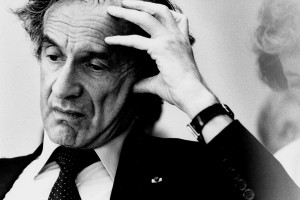
Elie Wiesel a appris de Monsieur Chouchani que “l’homme se définie par ce qui l’inquiète, non pas par ce qui le rassure”.
אלי ויזל למד ממר שושני ש”האדם מוגדר על-ידי מה שמדאיג אותו, ולא על-ידי מה
שמרגיע אותו
Who was Mister Shushani? Qui était Monsieur Chouchani?
Monsieur Chouchani (? – 1968), or “Shushani,” is the nickname of an otherwise anonymous and enigmatic Jewish teacher who taught a small number of distinguished students in post-World War II Europe and elsewhere, including Emmanuel Levinas and Elie Wiesel.
Not much is known about “M. Chouchani,” including his real name, a secret which he zealously guarded. His origins are completely unknown, and his gravestone (located in Montevideo, Uruguay, where he died in January 1968) reads, “The wise Rabbi Chouchani of blessed memory. His birth and his life are sealed in enigma.” The text is by Elie Wiesel who paid for this gravestone. The name “Shushani,” which means “person from Shushan,” is most probably an allegorical reference, or possibly a pun. Elie Wiesel hypothesizes that Chouchani’s real name was Mordechai Rosenbaum, while Hebrew University professor Shalom Rosenberg asserts that Chouchani’s actual name was Hillel Perlmann.
Although there is no known body of works by Chouchani himself, there is a very strong intellectual legacy seen in the influence on his pupils. By all accounts, Chouchani had the appearance of a vagabond and yet was reputed to be a master of vast areas of human knowledge, including science, mathematics, philosophy and especially the Talmud. Most of the biographical details of Chouchani’s life are known from the works and interviews of his various students, as well as anecdotes of people whom he encountered during his lifetime.
Chouchani appeared in Paris after the Second World War, where he taught between the years of 1947 and 1952. He disappeared for a while after that, evidently spent some time in the newly-formed state of Israel, returned to Paris briefly, and then left for South America where he lived until his death.
Emmanuel Levinas says about his Master Shushani
עמנואל לוינס אומר על מורו ורבו שושני
אבל ליד שושני לא שווים כלום”
Elie Wiesel écrit sur Monsieur Chouchani – Elie Wiesel wrote about Mister Shoshani
Elie Wiesel écrit sur son Maitre : “Mystère sept fois vérrouillé. Il ne parlait de lui-même que pour dérouter : oui et non se valaient, le bien et le mal tiraient dans la même direction. Ses théories, il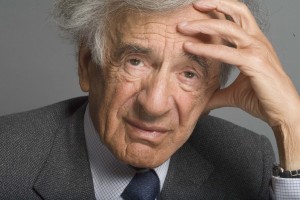 les construisait et les démolissait du même coup, en faisant usage des mêmes moyens. Plus on l’écoutait et moins on en apprenait sur sa vie, sur le monde qui l’habitait. Il possédait le pouvoir surhumain de se refaire un passé. Il inspirait la peur. L’admiration aussi, bien sûr. On disait de lui : “C’est un personnage dangereux, il sait trop de choses.” Il aimait qu’on le dît. Il se voulait seul, étranger, inaccessible.”
les construisait et les démolissait du même coup, en faisant usage des mêmes moyens. Plus on l’écoutait et moins on en apprenait sur sa vie, sur le monde qui l’habitait. Il possédait le pouvoir surhumain de se refaire un passé. Il inspirait la peur. L’admiration aussi, bien sûr. On disait de lui : “C’est un personnage dangereux, il sait trop de choses.” Il aimait qu’on le dît. Il se voulait seul, étranger, inaccessible.”
Monsieur Chouchani’s page on Facebook www.facebook.com/ChouchaniShushani
Monsieur Chouchani’s page on Facebook: www.facebook.com/ChouchaniShushani
Same message again, important:
We are producing a movie about Mister Shushani / Monsieur Chouchani / מר שושני
If you have any new information about this man, if you met him, or if you know people who met him, please contact us. Email: contactfilm@chouchani.com
Nous produisons un film sur Monsieur Chouchani / Mister Shushani/ מר שושני
Si vous disposez de quelque information nouvelle à propos de cet homme, si vous l’avez rencontré ou si vous connaissez des personnes qui l’ont rencontré, veuillez avoir la gentillesse de nous contacter. Email : contactfilm@chouchani.com
How many published books were written thanks to Mister Shushani?
Professeur Shalom Rosenberg dit de son maitre MonsieurChouchani : “On n’imagine pas le nombre de livres parus qui lui doivent tout.”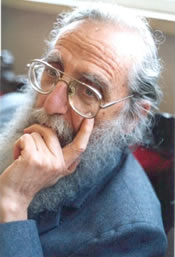
Professor Shalom Rosenberg says about his Master Mister Shushani: “One can’t imagine how many published books were written only thanks to him”.
פרופסור שלום רוזנברג אומר על מורו מר שושני : “קשה לתפוס כמה ספרים שהוצאו לאור נכתבו אך ורק בזכותו”
Admiration of a tramp by Professor Emmanuel Levinas
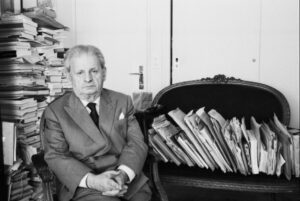 His disciple Emmanuel Levinas says about Mister Shushani that he was not impressed at first sight by the man. But after this first meeting he said “I don’t know what this man knows, but what I do know is that everything that I know – he also knows it.”
His disciple Emmanuel Levinas says about Mister Shushani that he was not impressed at first sight by the man. But after this first meeting he said “I don’t know what this man knows, but what I do know is that everything that I know – he also knows it.”
Levinas admired Shushani for the rest of his life.
תלמידו עמנואל לווינס מספר שכשראהו לראשונה לא גםהתרשם ממראהו, אך לאחר פגישה זו אמר “איני יודע מה האיש הזה יודע, אבל מה שאני כן יודע : כל מה שאני יודע – הוא גם כן יודע”. לוינס העריץ את שושני עד סוף ימיו.
Son élève Emmanuel Levinas raconte que lorsqu’il l’a rencontré pour la première fois, il n’était à première vue pas très impressionné par le personnage.
Mais juste après cette rencontre il a dit “Je ne sais pas ce que cet homme sait, mais ce que je sais c’est : tout ce que je sais – il le sait aussi.”
Levinas a admiré Chouchani jusqu’à la fin de sa vie.
Shoshani’s theory about the truth
Professor Shalom Rosenberg says about his Master Mister Shoshani: “He had a theory about the mystification of the truth. He thought that one should play cards with the truth, that truth maintains mysterious ties with imposture, that it can only be seized obliquely, by contortion, by surprise, by concealment, by misunderstanding. He liked anonymity, despised the honors, felt free and unattached. Somehow, he was a religious Jewish anarchist.” (in the book of Shlomo Malka about Shoshani).
Professeur Shalom Rosenberg dit de son Maitre Monsieur Chouchani : “Il avait une théorie sur la mystification de la vérité. Il pensait qu’il faut jouer aux cartes avec la vérité, que la vérité entretient des liens mystérieux avec l’imposture, qu’elle ne peut être saisie que de manière oblique, par la contorsion, par la surprise, par la dissimulation, par le malentendu. Il aimait l’anonymat, méprisait les honneurs, se sentait libre et sans attaches. D’une certaine manière, c’était un juif religieux anarchiste.” (rapporté dans le livre de Shlomo Malka sur Chouchani).
